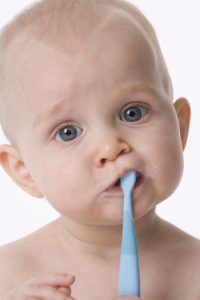As a dental hygienist, I get a lot of questions from parents about how to care for their children’s teeth. April being Oral Health month I decided to share some knowledge based on common questions received and what you should expect for the first dental visit and how to gear the kids up for going to the dentist.
Baby Teeth
There is a misunderstanding that baby teeth will fall out and therefore not important. WRONG. If you don’t teach your children to care for their baby (primary) teeth, what makes you think they will suddenly take an interest in caring for their adult teeth? Good habits start early.
Caring for Tiny Mouths
- Before teeth erupt, wipe the inside of the mouth and gums with a damp cloth once per day.
- Never put a child to bed with a bottle, especially if it contains milk, formula or juice. If your child insists on having something, water is the only option.
- If the child is a thumb or finger sucker, break the habit by the third birthday or permanent damages could occur needing orthodontic correction. By this age a child can self-sooth in other ways.
- Introduce the toothbrush and start using it daily as soon as the first tooth is fully erupted.
- Your child only needs a tiny, thin smear of toothpaste on the tip of the toothbrush, even a ‘pea sized’ amount is too much.
- If you live in an area with a regulated fluoridated water supply, fluoridated toothpaste doesn’t need to be introduced until closer to three years of age though introducing earlier won’t harm them. Just watch how much they swallow and apply only a tiny amount.
- It is important that children are allowed to practice brushing but parents should always go back and check and make sure all the food and plaque is being removed properly. The rule of thumb is that until a child can tie their shoes they need supervision with brushing.
- Until a child has confidently mastered brushing, hold off on flossing. I would rather they be very good at one thing than ”ok” at both. Once they are confident in brushing, introduce the flossing.
The First Dental Visit
Starting your child off on the right foot requires dental visits early in their life. While most professionals will tell you, and what I have been taught, the first dental visit should happen by ”first tooth or first birthday” whichever comes first. My professional experience has taught me differently though.
The logic behind this early visit is more for the parents. To educate on things to look out for and answer questions. Sometimes the dentist or hygienist manages to have a quick peek at the tiny teeth the baby may have, but realistically this won’t happen until two to three years of age.
For this reason, I usually tell my patients unless they have a concern, to hold off bringing their child until two to three years. While you should do whatever you and your dentist are comfortable with, until your child is old enough to sit still (either alone or on a caregiver’s lap) and allow a stranger to look in their mouth, the visit is usually not productive.
What to Expect
The main reason I like to hold off on the first dental visit until closer to three in age is that the child now has all their teeth and can interact in the appointment. After any questions and potential concerns are addressed with the parents, I like to engage with the child. Show them that coming to the dentist isn’t to be feared in any way. If I do nothing else in the appointment other than gain the child’s trust enough to convince them to return on their own terms, I’m happy and consider it a success. I don’t always get to ”clean” their teeth the first time. My primary focus is to make sure they’re comfortable and they trust me. I hate hearing stories of adults who were scarred as children and have terrible experiences at the dentist. Your job as a parent is to find a practitioner who you trust. If you like and trust them that will make your child’s life much easier.
I like to interact with the child by asking them about their teeth, how they like to brush, if mom and dad are helping, and usually ask them to show me how they do it, correcting any potential errors. Sometimes I manage to polish a few teeth but other times we just talk and do oral hygiene instruction.
Once all the teeth are erupted (between two and three). I always have a good look at the condition and health of the teeth and tissues and observe how their bite is coming together. If the parent has held off on their visit past the first birthday, this is almost always accomplished during their first appointment. By me showing them that I’m just going to have a look with a small mirror to look around, kids usually respond pretty positively and are quite proud of their little chompers.
Final Thoughts
As parents it is important to instill trust in whoever you see to treat your children. If the parent is hesitant or fearful in any way kids pick up on it! Starting good dental care early will help your kids the rest of their life.
Come back next week to learn about caring for older children and adult teeth!
Catherine is a first time momma to a rambunctious toddler. When she isn’t soaking up all that motherhood has to offer, you can find her blogging over at Plunged in Debt where she chronicles her and her husbands journey out of debt. You can also follow her on Twitter.

[…] @ Kids Ain’t Cheap writes Oral Health Month: The First Dental Visit – As a dental hygienist, I get a lot of questions from parents about how to care for their […]